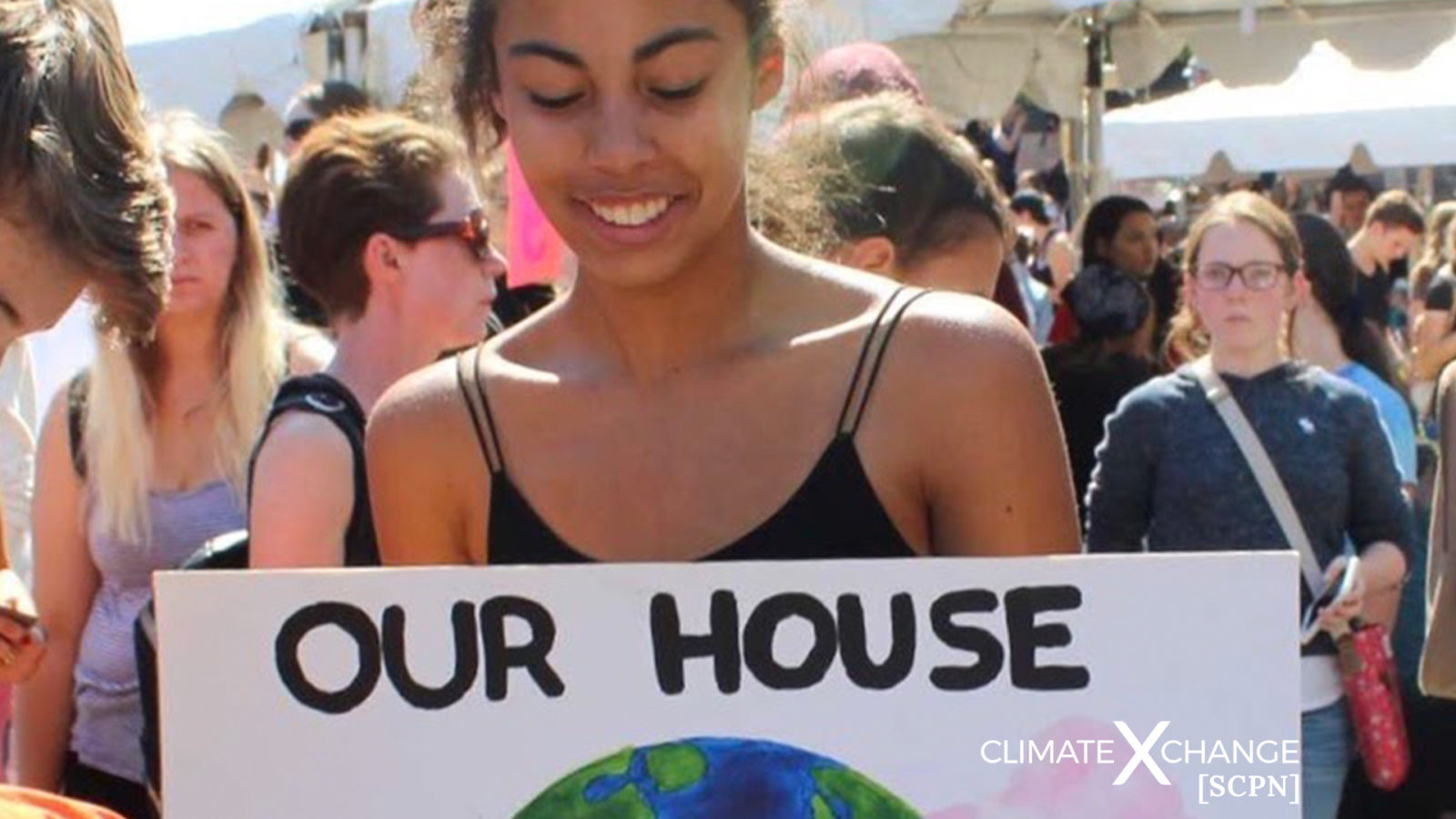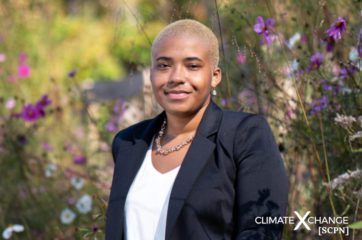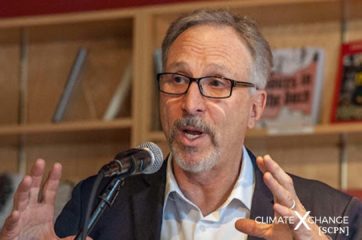All across the country, members of our State Climate Policy Network (SCPN) are fighting to make an impact on climate change in their communities. We have individuals in our Network from all 50 states, each experiencing climate change differently in their local areas and finding unique solutions to build resiliency efforts.
Haven Vincent-Warner is a youth climate activist working on advancing justice-oriented, climate legislation in Massachusetts. She is currently a Program Intern at Our Climate and part of the Frontloading Team at the Sunrise Movement. She is also a planning team member of Mass Power Forward and works on the Green Future Now Campaign in addition to working with Sunrise Western Massachusetts, including representing them in the Massachusetts Youth Climate Coalition.
This interview has been edited for clarity and brevity.
Ava Gallo
To start, can you talk about your journey into joining the climate movement?
Haven Vincent-Warner
When I was younger, I very much thought that climate change was a white people issue and is not the activism that I work on. It’s not my thing. That’s something I was told a lot and was very convinced of that. Solar panels? That is a thing for rich white people, and that could never be a thing in my life.
And then I had a really cool science teacher in sixth grade, and he really showed me that just wasn’t true. He taught us a lot about climate change and other cool science things. He was very much like, “No, climate change is an issue about people, and it affects people.”
A year later, I joined the Sunrise Movement, and I learned a lot more about climate change as an environmental justice issue and how it really affected people. So I joined Sunrise Western Mass. I went to a retreat and was immediately completely sold. I had done some other racial justice organizing before but never climate change organizing. I did a lot of political work when I joined, and I realized that political work is not my thing. I don’t enjoy campaigns. After that, I stepped away from Sunrise and joined Our Climate, which is how I met Tim from Climate XChange, and I started doing a lot more lobbying in the Statehouse and organizing around different districts in Massachusetts.
Ava Gallo
Can you talk a little bit more about the campaigns you are working on now with Our Climate?
Haven Vincent-Warner
I do a lot of different things. At Our Climate, I am a Program Intern right now. I have had a few different positions. But I also do a lot of coalition building, so I’m a part of the Green Future Now Coalition, which is working on writing an equitable carbon price and hopefully getting that passed in this session.
I’m also working with MA Renews on different Green New Deal legislation. As well as the Massachusetts Youth Climate Coalition on different climate justice legislation, but also just making the rest of the climate movement more accessible to different youth climate orgs. I’m also working on some summits that will involve all of the coalitions, which should be really interesting.
But at Sunrise, I also do a lot of community organizing specifically mobilizing Western Massachusetts, and I work with the Springfield Climate Justice Coalition around the Biomass campaign, and a few pipeline campaigns that I’m starting to get more information on working on in Longmeadow. I also am frontloading for the Sunrise National Movement, which means coming up with a plan for the next 5-6 years for the story, structure, culture, and strategy of Sunrise –– and that is really cool. I think that’s what I’m most interested in right now is big movement building, but also I really enjoy the local coalition building which is why I make sure that I can do it absolutely forever.
Ava Gallo
Wow, that’s a lot that you’re working on right now! And it’s a good time to be working in this space. I think that people are feeling a little bit of hope which is a different feeling than we felt for pretty much the last four years.
I want to dive a little deeper into some of the campaigns that you mentioned. Can you talk a little bit more about what role you think that a corporate polluter fee plays in the climate movement right now?
Haven Vincent-Warner
I think a lot of legislation is needed in order to actually fight climate change, but I think that a corporate polluter fee is a necessary bill even though I know this is a very controversial topic. There are people who don’t agree with this, but I do believe that in order to actually bring our emission levels down, we will need to put a price on carbon. And it is important that it is equitable, because that price will be passed to consumers. It’s not okay that it will affect the people who are already the most disadvantaged, so we have to make sure that this bill gives them the money to deal with the fees that are going to be passed on to them.
Ava Gallo
How do you think that the carbon pricing movement can do better at engaging with the environmental justice community and communities of color?
Haven Vincent-Warner
One thing that we’ve already started to do is having interviews with different leaders on environmental justice boards. That is really important. We have been compensating them for their time in these meetings, which is really valuable because this is not their main area of interest. We have been getting a lot of great feedback. I think we have made this bill a lot better than it was to start with, and I’m really excited about that. In general, I think we want to work on a plan to be very transparent about what we’re doing to make sure that if this bill ends up being written and passed, and it is not as good as we want it to be, that we won’t buy in for that bill because that bill hurts people.
Ava Gallo
What are some of the specific provisions that you’re trying to include in this bill to make it more equitable?
Haven Vincent-Warner
We are working on this. One concept is the direct cash payments or “the Green Household Dividends.” For Quintile 1 and 2, they will be getting more money back than any other quintile to make sure that people who are in the lowest-income communities will be getting more money right back to them. And then also working to make sure that a Green Infrastructure Fund will help people in environmental justice communities first.
There also will be a council established that has environmental justice leaders from around the state to make sure that all of these different things are actually going to the right communities and people are getting these payments. The Next Generation Climate Bill just passed and we will have some real definitions for environmental justice, so that we know this money will be going to the right places.
Ava Gallo
The other campaign that I want to dig a little bit more deeper into is the campaign to increase transparency at the Statehouse. I wonder if you can talk a little bit more about that campaign and why that is so important in Massachusetts in general but also for passing climate legislation?
Haven Vincent-Warner
I’m having a lot of fun with this campaign. There are three main changes in this campaign. We want to make changes to the Rules Committee. They were going to create these new rules in February, but now it’s moved to July, which gives us more time to talk to legislators about the changes. The first proposal is to change the roll call requirement so that there only needs to be 8 people to start the roll call instead of 16. This would make it much easier, because getting 16 people to stand up in order to actually vote on bills does not make sense, and their choice is a Yay or Nay vote, and that doesn’t make sense at all.
Another really important part that we are working on is around the publishing of different votes in committees. Committee votes right now are public in the Senate, but in the House they’re really inaccessible. In theory, you could find them, but you’d have to contact the Clerk. This change would mean that committee votes would be public on the website, and you would know exactly who voted for what, and no one would be able to get out of that in a sneaky way.
This is really important because so many bills, like the last equitable corporate polluter fee that we were fighting for, die in committee. We don’t know what happened at all and that is not fair, we should be able to know how these bills are dying. We won’t necessarily know based on these changes, but at least if these bills do you get voted on, we will know who voted on them, and we’ll know who we need to be talking to and who we need to actually vote out in order to get the changes we need.
And then there is one more thing. The last part of the transparency campaign is working on extending time for bills to be available to the public to 72 hours before the bill would be voted on, so that legislators actually have time to read the bills, and activists have time to actually meet.
Ava Gallo
So that has been a little bit delayed by pushing the vote on the rules, correct?
Haven Vincent-Warner
Yes.
Ava Gallo
Why do you think that that has been pushed?
Haven Vincent-Warner
I have heard a lot of reasons. Mariano, who is our Speaker of the House right now, claims that this is because he wants to make things more transparent and that more time is needed. I think he’s a little bit scared. I think that he saw that there was a lot of support for these changes and right now, if these things were voted on likely they would pass and that is scary, because then people would know why things were dying. Transparency is scary for people in leadership positions. Also, COVID-19 is still happening so it makes sense for committee rules to be extended. I think we expected that they would be, although it still doesn’t help, because we still don’t know what’s happening in the legislature.
Ava Gallo
Looking at a little bit more broadly, right now we have the new Biden administration, and we have a Congress that looks like it’s going to be a little bit more willing to act on climate. So, what are you most excited about for climate action at this moment, and on the other side, what are you nervous for or maybe a little wary that might happen?
Haven Vincent-Warner
I’m excited to finally be able to actually push people to make real change and to get these bills that we need to pass federally, because that is not an opportunity we have had. Under the Donald Trump administration, there was no chance of climate legislation being passed. Every protection was rolled back, and there was absolutely no pushing we could do, but now we actually can. As we see things passed federally and more money is given to climate change, hopefully that will pass down to states and municipalities. And we will be able to see these changes made everywhere, and people will see physical changes in their own lives and understand that we can get legislation that we need to better our own communities.
I will say, I am also worried that people will just assume that the Biden administration is going to do everything we need, they will fight climate change, and that these first few things that Biden did will solve everything. Unfortunately that is just not the case, and we have to do a lot more fighting to get more than Biden has even promised. We originally were fighting for $16 trillion being put towards climate change, and Biden has promised $2 trillion and even though people think he will keep that promise, we do not. So we have to keep pushing for what we actually think we need to solve the crisis.
Ava Gallo
That’s definitely what I heard echoed across the board is that we can’t become complacent. We can celebrate the victories that we have accomplished, because there’s been a lot of labor and a lot of time put into getting Biden elected and flipping the Senate. So, definitely people can take the time to pat themselves on the back, but that does not mean that we can settle for being back to normal, because normal was never acceptable.
I always kind of like to conclude on this positive note. And so, who or what inspires you to continue to work in the climate movement and on social justice in the world right now?
Haven Vincent-Warner
I think my friends inspire me. I think teenagers inspire me. I see people who become really sad about everything and think they’re going to have to work these nine to five jobs every day and, actually, there is a world where we both solve the climate crisis and create good jobs that people are actually interested in. The idea of people actually seeing that change is what inspires me. I am so excited to see people do what they’re actually passionate about in the world, and I think that solving the climate crisis is an enormous part of that, and it will create really cool jobs for people.
Ava Gallo
Ava Gallo: Awesome. Thanks so much for your time today. Chatting with you has been great!
Haven Vincent-Warner
Thank you for having me!









